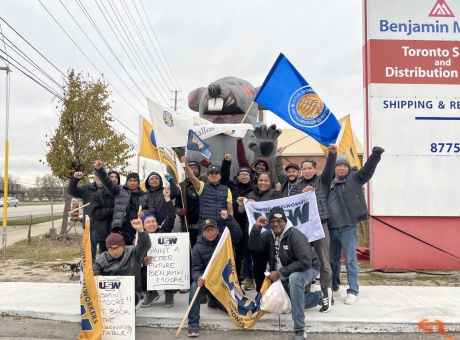Columns
You are here
Benjamin Moore workers join the rise in militant struggle

January 10, 2024
The affordability crisis is not ending and people are hurting. Shelters are way over capacity, refugees are sleeping on the streets, mortgage rates are high, and rents are out of control. The average cost of a one bedroom apartment in Toronto is $2502 per month, with a two bedroom going for $3353. A rent survey recently showed an increase of over 27% in the last year. Toronto leads the pack in cities across the country, but many are not far behind.
Canada’s 100 highest paid CEOs made 246 times what an average worker earns in a year, shown in a survey done by the Canadian Centre for Policy Alternatives. Families in Ontario are expected to pay an additional $700 this year in grocery bills. This is unsustainable for working families and the poor.
Chris Rampsaroop from Justica for Migrant Workers was quoted in the media demanding that migrant workers should be given full freedom of movement from one job to another. Unless they can prove abuse, they are tied to one employer. They are exploited, working under terrible conditions. Recently a class action suit was launched asking for almost a half a billion dollars for seasonal agricultural workers who have been denied benefits. They are not eligible for Employment Insurance even though they pay into the fund.
But these conditions have not been going unanswered by workers across North America. In the United States 2023 has been called the year of the strike. Over 500,000 have walked the picket line. SAG/AFTRA members were out for months in a high profile strike which won 14% over three years and significant increases in working conditions, which had been long sought. The United Auto Workers, which has also been calling for a cease fire in Gaza, won significant wage increase with the Big Three. The leadership called partial and rotating work stoppages. Activists thought even more could have been won if it was an all out strike but either way the lines were militant and gave inspiration to others. 75,000 health care workers at Kaiser Permanente also walked off the job demanding better conditions.
In Canada we saw members turning down tentative agreements. The International Longshore and Warehouse Workers, United Steelworkers at National Steelcar, Metro grocery workers and others all demnded better contracts. They showed both management and their union leaderships that they wanted more and were not afraid to strike to get it. You could sense the militancy on the lines and the lessons learned about the strength of collective action.
The Common Front brought out over 500,000 public sector workers and teachers in Quebec. They stood up to the provincial government and had broad support from the public, who overwhelmingly sided with the strikers. We have not yet seen the development of rank and file networks but there is evidence of workers self organizing which hopefully will lead to more.
It’s not just large workplaces. A Benjamin Moore warehouse north of Toronto was recently unionized by the United Steelworkers. There are seventeen members and each and every one has been is on the line since November 10th. They have entirely shutdown their workplace and have led secondary picketing at paint outlets, getting good support from customers. They are committed to the fight and know that they are part of building a renewed labour movement.
The bosses have not gone back to the table. A lot of pressure has been put on the company which values its reputation for producing high quality paint. This has to be kept up. It’s the first facility that has been unionized in their chain and the strikers think that management fears that a good contract will spark organizing at other locations. These workers reflect the diversity of Toronto and are fighting a strong battle for decent wages and their rights at work. Support the campaign, go out to the picket line and join secondary pickets at paint outlets. Solidarity with striking workers is what wins strikes!
Send a message to the Benjamin Moore bosses: Pay your workers!
Section:
Topics:









